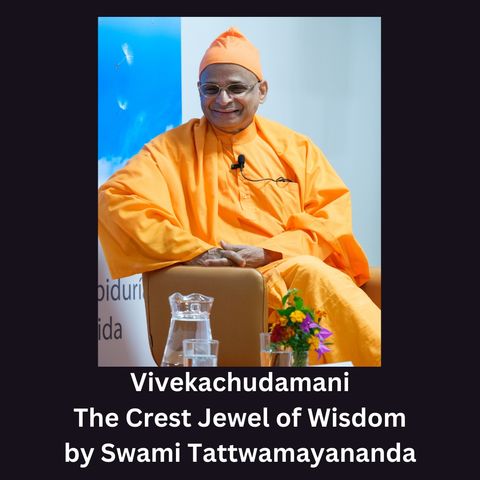Vivekachudamani The Crest Jewel of Wisdom 1 - Swami Tattwamayananda

Download and listen anywhere
Download your favorite episodes and enjoy them, wherever you are! Sign up or log in now to access offline listening.
Description
Title: Introduction to the Text and Author Vivekachudamani talks about one supreme reality. The goal of human life is to realize the truth about this supreme reality. It is based...
show moreVivekachudamani talks about one supreme reality. The goal of human life is to realize the truth about this supreme reality. It is based on the idea that creation is one spiritual family. Its author is Shankaracharya.
Gandhi says about Shankaracharya: “He established such a firm foundation in 32 years that the British empire could not undo in 190 years.
Sister Nivedita, a disciple of Swami Vivekananda writes about Shankaracharya in her book “The web of Indian life” as below, when she talks of Avatars:
The 7th and 8th verse of the 3rd chapter of Gita say: “Whenever there is a decline of dharma and increase of adharma, then an Avatara takes place to preserve dharma, to protect virtuous people, to remove their obstacles and to punish evil doers.” This verse is vindicated by the appearance of Shankaracharya.
He became a monk at the age of six years. He finished all his writings when he was 6 years old. He passed away at the age of 32. He founded 10 monastic orders.
India was prosperous during Shankaracharya’s time. The vedas became the genius of Hinduism for Shankaracharya. He was focused on giving a spiritual meaning to Vedic literature. Vedanta, as the highest reach of human spiritual evolution, is a creation of Shankaracharya. He founded a new method to write commentaries on sutra literature.
Not only was he a great philosopher, but also a great devotional poet. He wrote 138 devotional classics.
He did not reject any method of worship. He accepted all of them. He said that everything is an expression of the same divine reality that is present in everything and that is transcendental.
“We contemplate in wonder when we think of various saints from the west. Who could imagine all of this concentrated in one person.”
Coming back to the text, Vivekachudamani means “The crest jewel of spiritual wisdom”. The most authentic commentary on this text is written by Chandrasekhara Bharati.
Shankaracharya begins the text in the 1st verse with obeisance to his teacher: Govinda Bhagavatpada. “The one who understands the meaning of great vedantic statements, who understands the truth of the vedas, who is a knower of vedantic wisdom, to that Guru, I pay my respects.”
2nd verse: “The greatest gift that we have is not money or health but human life itself. It is rare. Rarer than this is a human life with spiritual inclination. Even rarer is the ability to discriminate between the Self and non-Self.” Human beings alone can think about the meaning of human existence and what lies beyond.
Everything in the empirical world is transient. Birth/death, poverty/wealth, health/disease are two sides of the same coin. All beings have to go through the six changes. Once we understand the transient nature of everything, we get spiritual wisdom and we can live in this world more intelligently.
Being born as a human being is rare. The verse praises human life and spiritual inclination (nara-janma-prasansha).
The verse says that ātmānātmavivecanaṃ is a higher quality – the ability to discriminate between the Self and non-Self. Once we realize that our identity is not this physical body, that our true identity is as Atman, we can live in the world in a more intelligent manner. The spiritual common sense based on what is eternal and what is non-eternal is the essential message of Vivekachudamani.
How can we judge whether our mind is healthy? The answer is in an ancient ayurvedic verse from Sushruta Samhita: “sama dosha sama agnischa sama dhatu mala kriyaaha| Prasanna atma indriya manaha swastha iti abhidheeyate”. It says that the body and mind are healthy when they do not remind us of their existence. This happens when we identify with Atman, something higher than the body and mind.
Information
| Author | Vedanta Society, San Francisco |
| Organization | Vedanta Society, San Francisco |
| Website | - |
| Tags |
-
|
Copyright 2024 - Spreaker Inc. an iHeartMedia Company

Comments